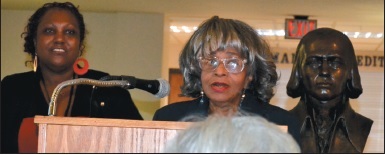
The city of Madison celebrated the 50th anniversary of the Madison’s Equal Opportunities Ordinance with a reception and multiple speakers at the Madison Municipal Building Dec. 12.
A half-century ago, a hard-fought campaign culminated in a night of impassioned debate and political drama with then-Mayor Henry Reynolds casting an early-morning, tie-breaking vote to create the ordinance that was born amid local and national struggles for equality. As first adopted, the ordinance banned discrimination by race, color, religion or national origin in public accommodation, employment, public facilities, and some kinds of housing. It also created an Equal Opportunities Commission.
The reception featured remarks by Mayor Paul Soglin, EOC Commissioner Lucia Nunez, Dr. Richard Harris, Mother Jacqueline Wright, Milele Chikasa Anana, Kaleem Caire, Ananda Mirilli and more.
“Today we are confronting a new era of [racial] gaps,” Soglin told the crowd. “We have one involving academic success. We have another involving incarceration. We have a third one that I think is more important than the other two because I think if we fix it, we fix the other two, and that is the economic and poverty gap. It's the gap in unemployment and the disparity in jobs that are sustainable for a family.”
The Equal Opportunities Ordinance predates the Civil Rights Act of 1964 and is now one of the most comprehensive ordinances in the nation, offering protection from discrimination in employment, housing, and public accommodations for 25 protected classes.
“We can say we are going to fix it in the name of the people who did these great deeds 50 years ago,” Soglin said, “but I think it's more important that we fix it in the name of the children who 50 years from now will look back and say, 'You changed my life and you changed the life of my brothers and sisters and parents.' That's the commitment we should make now.”
This year has also marked the 50th anniversary of many significant civil rights events, the “March on Washington,” the Bombing of the Sixteenth Street Baptist Church, the assassinations of President Kennedy and civil rights activist Medgar Evers.
“If these events had meaning for us — along with the loss of life, the risk of life and limb — we are going to go forward now and close the economic gap that is so fundamental to academic and educational success, so fundamental to changing the incarceration that takes place,” Soglin said.
Historically, groups like the National Association for the Advancement of Color People (NAACP) and the League of Women Voters, have been at the forefront of civil and human rights. In 1963, in the City of Madison, members of these two groups helped form the Madison Citizens for Fair Housing and were instrumental in addressing discrimination in the City of Madison by helping to draft and secure legal protection for residents of color.
“Participation is huge. If you look you will see just how many people were participating in the debate and the discussion in 1963,” Nunez said. “I hope we can continue that legacy of participation in whatever ways we can.”
Nunez introduced Mother Jacqueline Wright, widow of James C. Wright, who in May of 1968 was named the commission’s first executive director, serving for 24 years.
“I still say that Rev. Wright wanted to be part of this movement. The League of Women Voters saw something in him and asked him if he would help them in the civil rights movement and he got involved in the movement for equal rights in housing, for jobs, for better schools for people of all ages,” she said.
The Equal Opportunities Ordinance grew from studies and reports from 1959 through 1962 that revealed a major discrimination problem and that black families were restricted to two parts of the city. The ordinance has since grown to be one of the country’s most comprehensive local civil and human rights laws. Earlier this month, the City Council added the unemployed to a list of more than 20 protected classes.
“We would like to congratulate everybody here today for the work that they have done and for all those who have [passed] on to their destination,” Wright said. “They would be proud that we are still trying to do the best that we can to help people. It is our work. But do not despair. We will overcome. Do not give up the cause.”

